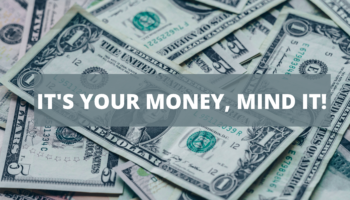The 4 obstacles that could be holding you back and what you can do to overcome them
“Wealth is not his that has it, but his that enjoys it.” — Benjamin Franklin
Building wealth is hard. This is why most people never achieve financial freedom.
If you search online, you will find millions and millions of books on how to build wealth. You will see the different types of strategies discussed. Some will even say it is easy.
Most will suggest some simple steps to take to achieve financial freedom and the list goes on and on and on.
So, why do most people never achieve financial freedom despite the number of resources available?
The answer is “Obstacles.”
Obstacles prevent most people from building and growing their wealth. To be clear, there could be millions of obstacles. Some within our control and others outside of our control.
There is no way I can tackle all possible obstacles here. Instead, I focus on 4 key financial obstacles that prevent most people from building tax-efficient wealth.
1. Taxes
“The best things in life are free, but sooner or later the government will find a way to tax them.” — Anonymous
Most Canadians will consider housing costs as their biggest expense.
Unfortunately, they are wrong!
According to a recent report from the Fraser Institute, the average Canadian family spent 43.6 percent of their income on taxes in 2018, more than they spent on housing and other expenses combined.
Can you imagine that? This is significant. The average family’s total tax bill at 44 percent is double the amount they’re paying on housing costs each year.
So, if taxes are our biggest expenses, why is it that most people don’t pay attention to it? Why is it that most Canadians and the news media get it all wrong?
There are two main reasons for this.
First, the majority of us are used to withholdings. We never see a good part of our money as our employers take it upfront from our salaries and remit to the government.
Second, other forms of taxes we pay on everyday purchases seem insignificant on a transaction by transaction basis.
The total tax bill considered in the Fraser report reflects taxes families paid to the federal, provincial and local governments — including income, payroll, sales, property, carbon, health, fuel and alcohol taxes.
Consider this. The average person in a developed country (Canada included) spends 20 to 35 percent of their life working to pay taxes. In other words, an average person dedicates more than two hours of every workday to feed the government.
If you do the math, this is equivalent to approximately 13 years in your work life and 20 years in your lifetime.
This is a prison sentence!
And it will get worse. With rising government spending, we expect to pay higher taxes in the future to deal with the rising debt level.
As inflation spikes, the spending power of our currency will be dramatically reduced.
As you put these pieces together, you can now appreciate the impact of taxes on your personal finances. This is one reason why most people never achieve financial freedom.
It is a big obstacle.
To be clear, paying taxes is important for the benefits it provides to our society as a whole. What you have to consider is whether you’re paying more than your fair share of taxes.
While I highly recommend that you pay whatever taxes you are legally required to pay, you should consider legal options available in our Tax Act to reduce your tax burden.
So, what can you do to reduce your taxes?
- Start by educating yourself. I share a lot of articles on how you can get started. Some of these include 10 Reasons Why You Pay Too Much In Personal Taxes; Which is Better — Tax Credit or Tax Deduction?; 10 Mistakes the Do-it-yourself Taxpayers Make When Filing Their Tax Returns; Know Your Marginal Tax Rate and Save on Taxes; and many more.
- Get your most recent tax returns and review to see how much you’re paying in taxes. Start considering how you can pay less next year. Read the article on “An Exercise That May Reveal Something Shocking” and consider doing the exercise.
- Seek advice from a professional to help you plan on how you can optimize your taxes.
2. Non-Deductible Interest
“Tax laws favor capital over labor, giving capital gains a lower rate than ordinary income. The rich get humongous mortgage interest deductions while renters get no deduction at all.” — Robert Reich
The biggest asset we own is our primary residence for those that own their own homes. The cost of buying a home continues to rise, and it is getting increasingly unaffordable for most young people today.
As the cost of housing rises, so is our mortgage balance. Added to this is the rising debt of the Canadian household. As a result of all these high debt balances, most Canadians are now burdened with high-interest costs associated with these debts.
Unfortunately, in Canada, our tax rules generally do not permit a deduction for the mortgage interest related to our primary residence.
Furthermore, most interest on other debt we have is also not deductible for tax purposes except the debt that is incurred directly to earn income from a property or business.
Most of us never put a lot of thought on this as we automatically pay our mortgage each month or every two weeks without examining how much of this payment goes towards the reduction of our principal balance.
The fact that you cannot deduct your biggest interest cost is a huge obstacle that will prevent you from growing your wealth.
So, what can you do about this?
- I encourage you to start by looking at your mortgage statement or your amortization schedule and see the amount of payment that goes towards interest payment alone. You will quickly notice that it is significant.
- Consider strategies to convert some of these non-deductible interest costs to tax-deductible interest costs. An example is renting part of your home so you can deduct part of the mortgage interest for tax purposes.
- In certain circumstances, taxpayers can obtain an interest deduction for borrowings made for specific purposes. The general rule of thumb is that interest is deductible to the extent the borrowed monies are used to earn income. Consider strategies that will allow you to pay down your mortgage, then borrow the funds as home line equity to invest in an appreciating asset.
3. Cash Flow Crunch
“There is really only one way to address cash flow crunches, and it’s planning so you can prevent them in advance.” — Elaine Pofeldt
Have you wondered why you have very little or no money left shortly after your payday?
Are you one of those high-income earners that make over $100,000 per annum and still wonder, where is all my money?
The clue may be in the diagram below:

For the average Canadian employee, taxes are taken upfront through payroll withholdings before we see the money.
With the funds left, we now have to pay for all our expenses, the majority of which are non-deductible for tax purposes. Payments like mortgages or rent, car payments, childcare expenses, gas, food, clothing, and other household expenses deplete our cash.
At the end of the day, we have little or no cash to invest. In fact, based on the current trend of rising household debt, a good number of Canadians pay for some of these expenses using credit cards, lines of credit, etc. thus, adding layers of non-deductible interest costs.
The tax-smart taxpayer will conserve more cash by reverse-engineering the cash flow pattern so that there is more cash left over to invest and grow wealth.
So, what can you do to maximize your cash flow in a tax-efficient way?
- Consider obtaining tax planning advice that will enable you to make changes to your lifestyle so you can save more of your cash to grow and accelerate your wealth.
- Contact your employer to reduce the amount of upfront deductions from your salary.
- Convert some of the after-tax expenses to before-tax expenses and converting some of your non-deductible interest costs to tax-deductible interest costs.
4. Inflation
“Inflation is like sin; every government denounces it and every government practices it.” — Frederick Leith-Ross
What is inflation?
Inflation is the rate at which the general level of prices for goods and services is rising.
I refer to this as the silent killer as we often don’t see it.
While most Canadians are familiar with inflation, we often underestimate the powerful impact it has on our ability to grow our wealth and eventually achieve financial freedom. Ironically, we often think of financial freedom in terms of dollar value rather than in terms of the purchasing power of our dollars (the amount of goods and services you can buy).
At the end of the day, if you’re unable to acquire what you need when you need it, then you’re not necessarily financially free.
I discuss inflation in detail in the article “The Silent Killer — Inflation”. I encourage you to read this for a deeper understanding of the devastating impact of inflation.
Inflation will rob you. It will reduce your purchasing power. And it will kill you, financially that is, if you don’t pay attention.
So, what can you do to protect yourself from inflation?
- Invest in real estate — it is a great hedge for inflation.
- Invest in precious metals like gold and silver — history suggests that these metals hold their values when everything else crumbles.
- Invest in yourself — arm yourself with the knowledge that no one can take away.
In Conclusion
You now have a better understanding of what may be holding you back from achieving financial freedom.
You are now aware of the major obstacles.
In my upcoming eBook, I go into some details on how you can tackle these obstacles in a tax-efficient manner. In the coming weeks, as I get closer to the release date of the book, I will show you how you can get it for FREE.






